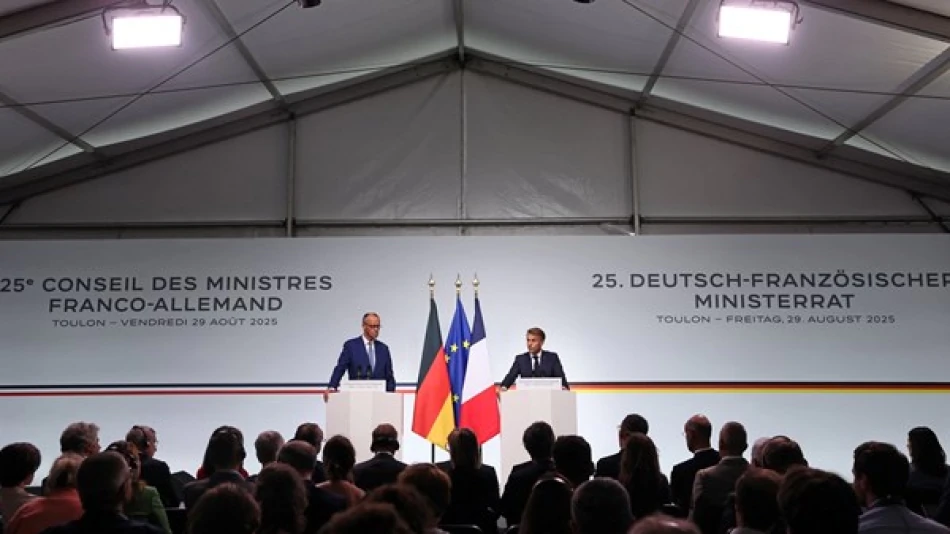
Mertis Warns Ukraine Crisis May Drag On for Months
Merz Pushes for Transatlantic Unity as Ukraine War Threatens to Drag On
German Chancellor Friedrich Merz is calling for urgent high-level talks between European and American officials next week, warning that the Ukraine conflict could persist for "several more months." His diplomatic push comes as Western allies face mounting pressure to maintain unity in their support for Kyiv while navigating an increasingly complex geopolitical landscape.
Franco-German Alliance Seeks Washington Coordination
Speaking alongside French President Emmanuel Macron following Franco-German talks in the French city of Toulon on Friday, Merz emphasized the critical need for transatlantic coordination. "I strongly urge that we Europeans discuss the next steps carefully together with the American government," he stated during the joint press conference.
The timing of Merz's call reflects growing European concerns about maintaining strategic alignment with the United States, particularly as the conflict enters what many analysts view as a potentially decisive phase. The Franco-German meeting in Toulon underscores the renewed importance of the European Union's traditional engine of integration in times of crisis.
Direct Putin-Zelensky Talks Still on the Table
Despite the challenging diplomatic climate, Merz outlined an ambitious goal: facilitating direct negotiations between Russian President Vladimir Putin and Ukrainian President Volodymyr Zelensky, "with the participation of other parties in the talks if necessary."
This proposal represents a significant diplomatic gambit, considering that direct talks between the two leaders have been virtually non-existent since the early weeks of the conflict. Previous attempts at high-level negotiations, including early mediation efforts by Turkey and Israel, have yielded little concrete progress.
Preparing for a Protracted Conflict
Merz's sobering assessment that the war could continue for "several more months" reflects a growing realization among Western leaders that the conflict may not reach a swift resolution. "However, I have no illusions. This war could continue for several more months," he acknowledged.
This timeframe suggests European leaders are recalibrating their expectations and resource commitments. The acknowledgment of a potentially extended conflict timeline has significant implications for military aid packages, economic sanctions sustainability, and domestic political support across NATO member states.
Coalition Unity Under Pressure
The German Chancellor emphasized that maintaining cohesion among the approximately 30-nation coalition supporting Ukraine represents an "urgent task." This concern reflects real challenges facing the alliance, including varying levels of military support, differing economic impacts from sanctions, and evolving domestic political pressures.
Merz's emphasis on the "coalition of the willing" suggests recognition that not all partners may maintain equal commitment levels as the conflict extends. Historical precedents from other prolonged international interventions show that coalition fatigue can become a significant factor in determining conflict outcomes.
Economic and Strategic Implications
The call for extended preparedness carries substantial economic implications for European economies already grappling with energy costs, inflation, and defense spending increases. Germany, as Europe's largest economy, faces particular pressure to maintain both financial support for Ukraine and domestic economic stability.
Merz's assurance that "we will not leave Ukraine in a critical situation" represents a significant long-term commitment that will likely require sustained public support and parliamentary backing across multiple European capitals.
Transatlantic Relations at a Crossroads
The German Chancellor's push for closer coordination with Washington comes at a critical juncture for transatlantic relations. European leaders are increasingly focused on ensuring continuity in American support while simultaneously developing greater strategic autonomy in defense matters.
This dual approach reflects lessons learned from previous conflicts where shifting American priorities left European allies managing complex situations with limited resources. The emphasis on joint planning suggests European recognition that successful outcomes require sustained American engagement alongside robust European commitment.
Most Viewed News

 Layla Al Mansoori
Layla Al Mansoori






